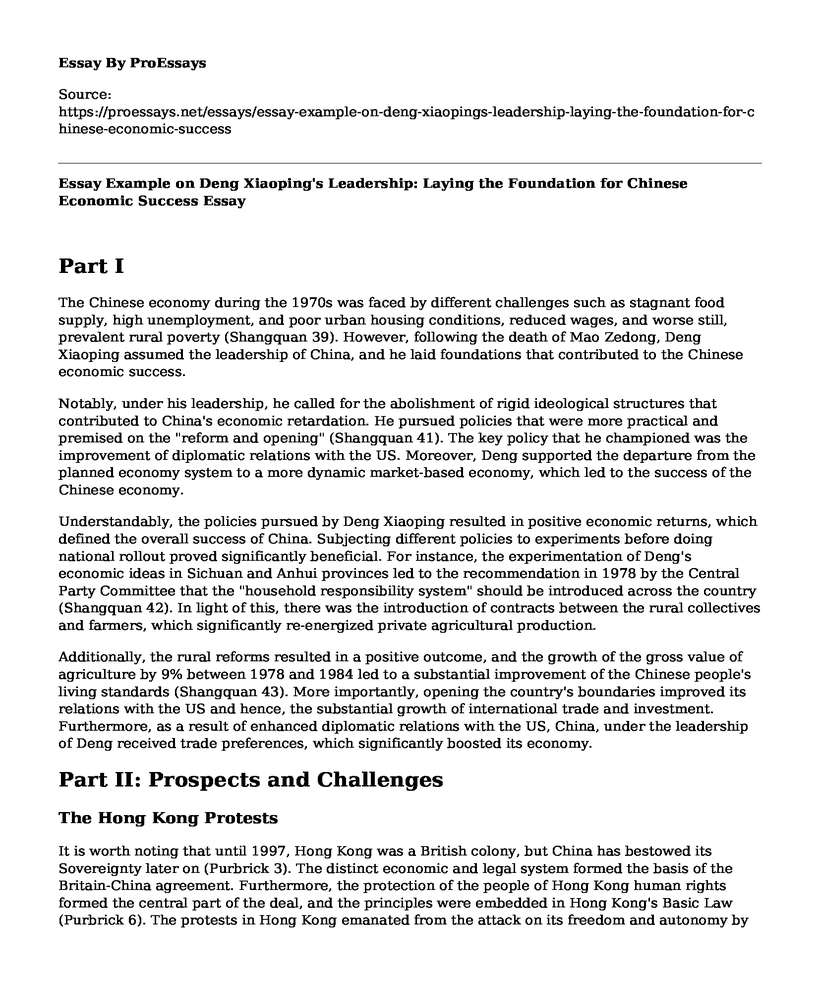Part I
The Chinese economy during the 1970s was faced by different challenges such as stagnant food supply, high unemployment, and poor urban housing conditions, reduced wages, and worse still, prevalent rural poverty (Shangquan 39). However, following the death of Mao Zedong, Deng Xiaoping assumed the leadership of China, and he laid foundations that contributed to the Chinese economic success.
Notably, under his leadership, he called for the abolishment of rigid ideological structures that contributed to China's economic retardation. He pursued policies that were more practical and premised on the "reform and opening" (Shangquan 41). The key policy that he championed was the improvement of diplomatic relations with the US. Moreover, Deng supported the departure from the planned economy system to a more dynamic market-based economy, which led to the success of the Chinese economy.
Understandably, the policies pursued by Deng Xiaoping resulted in positive economic returns, which defined the overall success of China. Subjecting different policies to experiments before doing national rollout proved significantly beneficial. For instance, the experimentation of Deng's economic ideas in Sichuan and Anhui provinces led to the recommendation in 1978 by the Central Party Committee that the "household responsibility system" should be introduced across the country (Shangquan 42). In light of this, there was the introduction of contracts between the rural collectives and farmers, which significantly re-energized private agricultural production.
Additionally, the rural reforms resulted in a positive outcome, and the growth of the gross value of agriculture by 9% between 1978 and 1984 led to a substantial improvement of the Chinese people's living standards (Shangquan 43). More importantly, opening the country's boundaries improved its relations with the US and hence, the substantial growth of international trade and investment. Furthermore, as a result of enhanced diplomatic relations with the US, China, under the leadership of Deng received trade preferences, which significantly boosted its economy.
Part II: Prospects and Challenges
The Hong Kong Protests
It is worth noting that until 1997, Hong Kong was a British colony, but China has bestowed its Sovereignty later on (Purbrick 3). The distinct economic and legal system formed the basis of the Britain-China agreement. Furthermore, the protection of the people of Hong Kong human rights formed the central part of the deal, and the principles were embedded in Hong Kong's Basic Law (Purbrick 6). The protests in Hong Kong emanated from the attack on its freedom and autonomy by the Chinese Central Government.
Most recently, the Hong Kong protests have emerged as a central issue in China. In March 2019, there were massive protests in the streets of Hong Kong after Hong Kong's government proposed a bill that could have paved the way for the extraditions to mainland China (Purbrick 8). The Hong Kong police have demonstrated an unprecedented response to the protests through the use of pepper spray, batons, rubber bullets, and tear gas, among others.
Despite the abandonment of the Extradition Bill, the movement has morphed into a call for significant change, which has sustained the Hong Kong protests (Purbrick 11). The movement has called for the government to stop identifying their protests as riots and, most importantly, an independent inquiry into massive use of force by the police during protests.
Moreover, the protesters are championing for major political reforms that would embed the much-needed democratic tenets in Hong Kong (Purbrick 14). Notably, the Hong Kong protests have been largely peaceful. Still, the incidences of violence have been caused by the brutality of the police who have failed to adhere to their primary duty of maintaining law and order and, worse still, disregarding that international human rights law.
Works Cited
Purbrick, Martin. "A Report Of The 2019 Hong Kong Protests." Asian Affairs, 2019, pp. 3-23. https://www.tandfonline.com/doi/full/10.1080/03068374.2019.1672397
Shangquan, Gao. China's Economic Reform. Springer, 2016, pp. 39-43. https://books.google.co.ke/books?hl=en&lr=&id=ARW_DAAAQBAJ&oi=fnd&pg=PR9&dq
Cite this page
Essay Example on Deng Xiaoping's Leadership: Laying the Foundation for Chinese Economic Success. (2023, Mar 02). Retrieved from https://proessays.net/essays/essay-example-on-deng-xiaopings-leadership-laying-the-foundation-for-chinese-economic-success
If you are the original author of this essay and no longer wish to have it published on the ProEssays website, please click below to request its removal:
- Deliberations on and Suggestions for Revising Canon Four of the Code of Ethics for Engineers
- Paper Example on CyberLeet Technologies' Business Culture
- Essay on Unleash the Power of Decision Support System (DSS): Flexible, Easy to Develop & Impactful
- Apple's Strategic Model for Value Creation: Solving Problems for Customers - Research Paper
- Italy's Economic Crisis: Action Needed to Strengthen Growth Prospects - Research Paper
- Essay Example on Criminal Justice in US: Changes Since the Early 1970s
- Essay on Reforming the American Criminal Justice System: An Indictment from the Legal Academy







